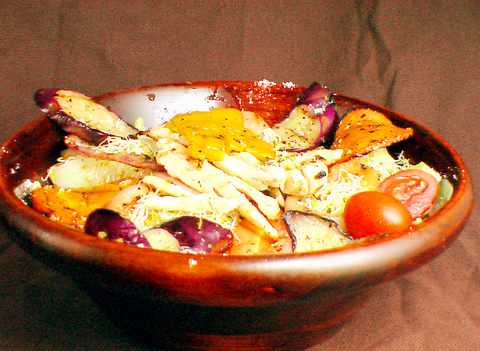Andrew Lunman has seen the world as a chef in top-notch restaurants. He cut his teeth in the culinary arts in Club Med in Australia, and in the posh restaurants of British Columbia's ski resorts.
"I was having a hard time making ends meet," Lunman said, "and a friend told me about Taiwan, so I came."
Lunman gets a lot of mileage out of his many skills in Taipei, and the locals are better off with Lunman around, too. Whether teaching youngsters English or in-line hockey, or serving up tasty burgers in his own fine eatery, this jolly, laid-back Canadian keeps himself busy serving his community.

PHOTO COURTESY OF BONGOS
His crowning achievement is Bongos, Gongguan's best-kept secret. The tucked-away burger joint doesn't advertise much, but National Taiwan University students and many westerners know where it is.
Bongos is definitely its owner's restaurant. The bistro is low-key, comfortable, and sophisticated. Lunman himself is rarely absent on busy days, bantering with the lunch and dinner crowds, and ensuring the quality of the food. In terms of ambiance, Bongos' terracotta tile flooring, track lighting, hardwood deck, superb geomancy and cleanliness will put you right at ease. Diners have the option of sitting outside on the deck as well.
The back parlor's walls are laden with all kinds of books -- the largest collection of used English titles in Taipei, according to Lunman. His restaurant doubles as a bazaar, with customers bartering and buying books and artwork.
Bongos gets its cuisine right, too. From zesty pasta dishes, Mexican food and German sausages to superb hamburgers, the restaurant boasts an eclectic assortment of tasty western dishes. Beer and wine drinkers and vegetarians will also feel at home.
"Bongos is vegetarian-friendly. We make an effort to offer quality veggie fare," Lunman told the Taipei Times. Drinks include plenty of Belgian and English beers, as well as other imported beers, with red and wine white wines sold by the bottle.
Although Bongos' burgers and chicken quesadillas are among the best in Taipei, Lunman says that his fresh-cut fries are the real draw. As if this hip fusion restaurant didn't offer enough variety, Lunman says that pizza will be added to the menus soon.

Last week the story of the giant illegal crater dug in Kaohsiung’s Meinong District (美濃) emerged into the public consciousness. The site was used for sand and gravel extraction, and then filled with construction waste. Locals referred to it sardonically as the “Meinong Grand Canyon,” according to media reports, because it was 2 hectares in length and 10 meters deep. The land involved included both state-owned and local farm land. Local media said that the site had generated NT$300 million in profits, against fines of a few million and the loss of some excavators. OFFICIAL CORRUPTION? The site had been seized

Next week, candidates will officially register to run for chair of the Chinese Nationalist Party (KMT). By the end of Friday, we will know who has registered for the Oct. 18 election. The number of declared candidates has been fluctuating daily. Some candidates registering may be disqualified, so the final list may be in flux for weeks. The list of likely candidates ranges from deep blue to deeper blue to deepest blue, bordering on red (pro-Chinese Communist Party, CCP). Unless current Chairman Eric Chu (朱立倫) can be convinced to run for re-election, the party looks likely to shift towards more hardline

Sept. 15 to Sept. 21 A Bhutanese princess caught at Taoyuan Airport with 22 rhino horns — worth about NT$31 million today — might have been just another curious front-page story. But the Sept. 17, 1993 incident came at a sensitive moment. Taiwan, dubbed “Die-wan” by the British conservationist group Environmental Investigation Agency (EIA), was under international fire for being a major hub for rhino horn. Just 10 days earlier, US secretary of the interior Bruce Babbitt had recommended sanctions against Taiwan for its “failure to end its participation in rhinoceros horn trade.” Even though Taiwan had restricted imports since 1985 and enacted

Enter the Dragon 13 will bring Taiwan’s first taste of Dirty Boxing Sunday at Taipei Gymnasium, one highlight of a mixed-rules card blending new formats with traditional MMA. The undercard starts at 10:30am, with the main card beginning at 4pm. Tickets are NT$1,200. Dirty Boxing is a US-born ruleset popularized by fighters Mike Perry and Jon Jones as an alternative to boxing. The format has gained traction overseas, with its inaugural championship streamed free to millions on YouTube, Facebook and Instagram. Taiwan’s version allows punches and elbows with clinch striking, but bans kicks, knees and takedowns. The rules are stricter than the